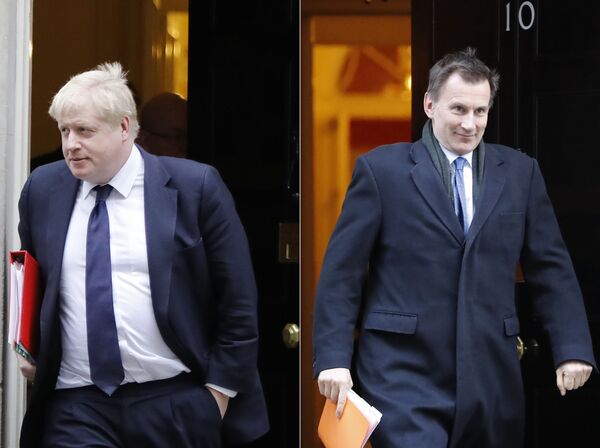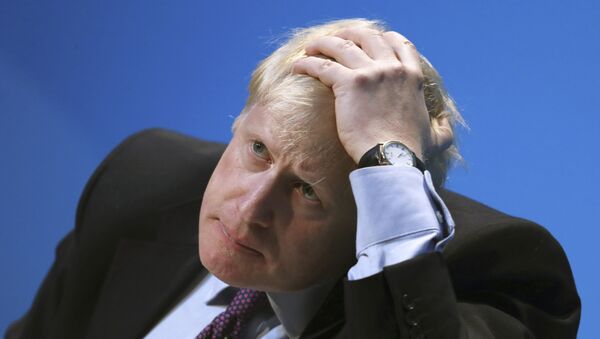Sputnik has discussed Brexit and the Tory leadership race with Steve Keen, a crowdfunded Professor of Economics on Patreon, based in the UK.
Sputnik: Boris Johnson has said that the existing system has led to "inevitable waste" as funds were simply "shoved out of the door", calling to abolish or merge several government departments such as Justice, Business, Transport, International Trade, Work and Pensions, and Brexit in order to save 8 billion pounds if he is elected prime minister. In your view, what does Mr Johnson mean by these two terms "inevitable waste" and "shoved out of the door"?
Steve Keen: What he means is that he doesn’t understand bureaucracy nor does he doesn’t understand macroeconomics. Because the first thing he is saying is we have to save money. This is the attitude that individuals have that if they spend less than they earn then they can save money and that gives them a buffer for the future. But at the national level what you spend becomes somebody else’s income. And if the government tries to save money, what it does is spend less money, and by spending less money, GDP falls by initially precisely as much as the government stops spending. So what he is saying is going to be saving of money of something like $5 billion will actually reduce the UK’s GDP by $5 billion. So to begin with, it is a stupid idea.
Secondly, when these ideas about rearranging bureaucracies are imposed from the top, the political top – I have had personal experience of watching this happen – it doesn’t save money, it causes utter confusion inside the bureaucracy. Normally what happens is that any fall in saving, it’s courtesy of things being done less well in the future. And I think that's certainly going to be the case where he was talking about handing across some elements of foreign affairs to the Home Office or things like that when the Home Office is notorious because its basic role is to be rude to foreigners, which is hardly the sort of thing one wants in foreign affairs. But of course, that is what Boris himself was accused of when he was Foreign Affairs Minister.
Sputnik: Boris Johnson, who officially launched his campaign to run for UK Prime Minister last month, has yet to comment on these claims. Could you name the possible reasons for slimming down the government?
Steve Keen: This is all part of his campaign to get elected by the Tory membership. And on that front, he is saying things the Tory membership wants to hear, so the Tory membership does believe that the government should spend less and does believe that savings become savings to spend at the national level rather than a fall in income. So this is just what they want to hear just like he was talking about cutting the maximum tax rate. That was something which would not appeal to the electorate because lots of people would not benefit from the tax cuts. But it would appeal to the people who are voting for him as leader. So he is just doing everything he needs to become leader and most likely will succeed.
Sputnik: In your opinion, could this offer attract UK business? And who might this offer attract, if at all?
Steve Keen: This sort of thing is often a prelude to outsourcing government functions which again the Tories have done a lot of. I mean we had the handing over the rail system to the private sector which of course has been a disaster. But also a lot of services are being privatised. And part of the savings I am sure would be privatisation again where functions that are currently carried out by the government would be given to the private sector. It might make a profit for the private sector but it tends to come again at a cost of an increase in the price of services for the public and lower quality services. So I can see it helping a lot to private groups, they'd be cheering him on but it won’t be good for the economy or for society.
Sputnik: A source from Johnson's entourage is saying that any modification or streamlining of the government would have to wait until after Brexit is delivered. But how could this initiative affect Boris Johnson’s image and his chances of winning the PM's seat?
Steve Keen: Well, I mean his image only matters to the Tory membership. And that is an incredibly small proportion of the population and a very wealthy section of the population. So, everything he is doing would be implying good things for this section that doesn’t need government services particularly so if they decline in quality it won’t affect them. And when they are talking about the top tax rate being cut in half that will affect them very beneficially. So everything he is saying is to get elected leader by the Tory Party. Of course, what happens when he gets in office may be completely different but I think in many ways even though Boris doesn’t normally have an opinion that lasts more than 30 seconds, it is quite likely this is his opinion about what is a good idea to begin with. So he'll probably try to impose them until they backfire on the economy once he becomes prime minister.

Sputnik: In your view, in case he wins, do you think he will realise everything he promised during the run for prime minister?
Steve Keen: No, I think really this is to get himself elected leader. I think the first thing he will do after that is to focus on Brexit which I think will fail because I can’t see any majority for really any resolution at all for Brexit in the Parliament. So I think we will be simply swapping a Theresa May for Boris with no change in this stalemate in British politics that nobody wants to bring Brexit through. What I think will happen quite likely is that Boris is more popular than May – very hard to be less popular than May – and once he becomes leader he will probably call an election. And then with a national election he will commit the Tory Party to one position or the other. And then it's the party that wins that will get the leadership. Now again, I think that could backfire too because the only party that is going to have a unified position on Brexit is the Brexit Party and that is led by Nigel Farage. So I have a feeling that if we have an election called by Boris, the end up could be that Nigel Farage becomes prime minister.
Sputnik: What are your prognoses about the outcome of Brexit? I mean a “no deal”, hard or soft Brexit?
Steve Keen: Well, I think it depends on while we have the current parties in power I think it will be delayed. But if an election is held and if Nigel Farage’s party wins, it will be a hard Brexit shortly after the election victory.
The views and opinions expressed by Steve Keen are those of the expert and do not necessarily reflect those of Sputnik.



